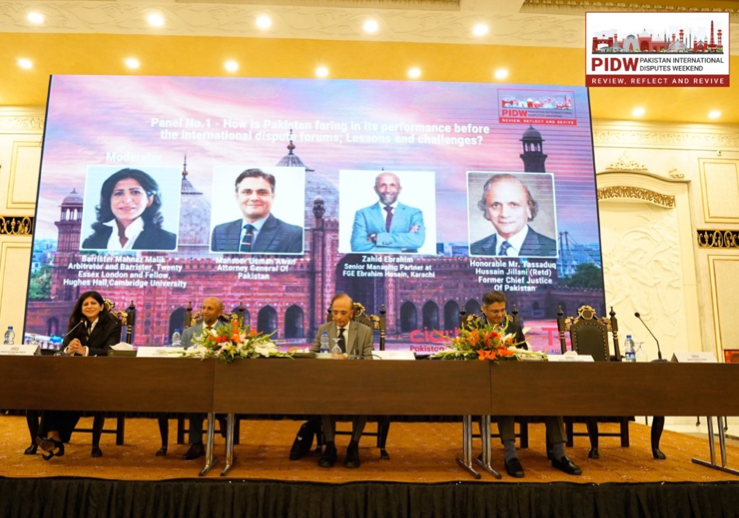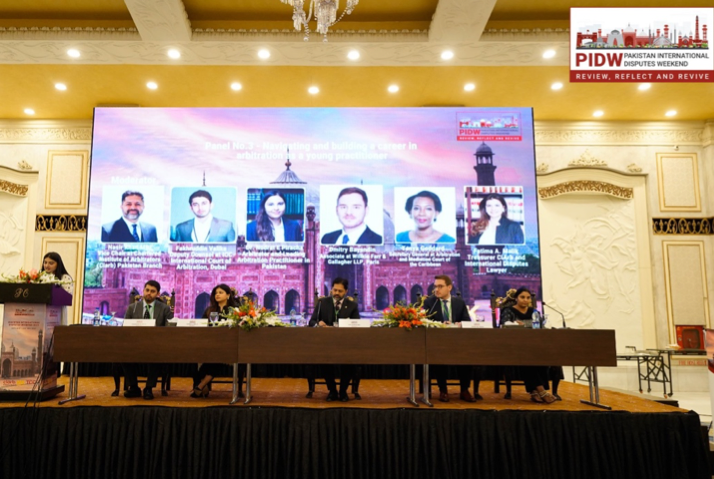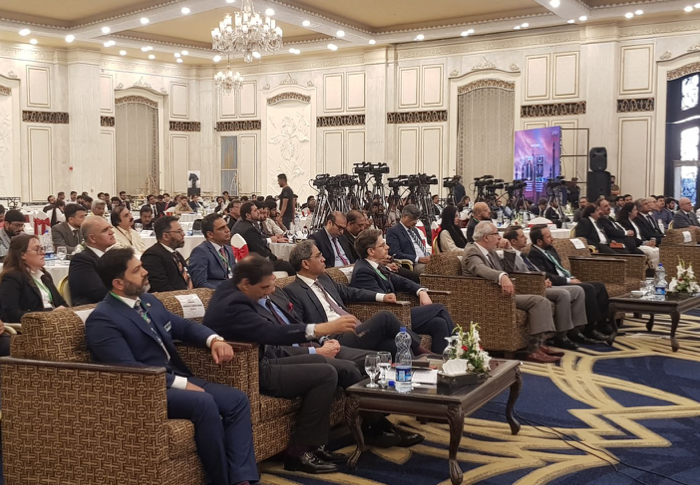Last month, Pakistan International Disputes Weekend 2023 (PIDW 2023) brought to the fore important discussions on international dispute resolution, to support restructuring access to justice and improvement of the rule of law index in Pakistan.
This post recaps the discussions on Day 2 of PIDW 2023, whilst yesterday’s post highlighted the key points from Day 1. Day 2 included presentations by an impressive line-up of speakers, ranging from serving Chief Justices of the High Courts of Pakistan to retired judges of the Supreme Court of Pakistan (SC), the Attorney General of Pakistan, distinguished international and domestic legal practitioners and representatives of international ADR Centres. The event was attended by key players from the legal and business community as well as students from all over Pakistan.
The day began with an opening speech by Mian Sheraz Javaid, Barrister at No.5 Chambers, Partner at MK Consultus LLP, and Chair of CIArb Pakistan Branch, followed by a virtual address by John Bassie, President CIArb, and Catherine Dixon, Director General at CIArb HQ. Both congratulated the organisers and participants for the inauguration of CIArb Young Members’ Group Pakistan (YMG-P) and highlighted the various initiatives by CIArb globally. Thereafter, Fatima A. Malik (the author), an international disputes lawyer based in London and Treasurer at CIArb-P and a founding member of the YMG-P, along with Maryam Abbasi, the chair designate, spoke to underscore the importance of promoting gender and age diversity in the legal profession.
Panel on Pakistan and International Disputes

Mahnaz Malik, Arbitrator and Barrister at Twenty Essex London, moderated the first panel on Day 2, titled, “How Pakistan is faring before international arbitration tribunals: Lessons and challenges”. The panel comprised of Mansoor Usman Awan, the Attorney General of Pakistan; Zahid Ebrahim, Senior Partner at FGE Ebrahim Hosain; and Justice Tassaduq H. Jilliani (Retd.), former Chief Justice (CJ) of SC. Ms Malik noted that despite the fact that Pakistan entered in to the world’s first BIT with Germany and its early accension of the New York Convention (NYC) and ICSID Convention, Pakistan was slow to implement the NYC and ICSID Convention into its domestic law, and only did so in 2011. Over the years, Pakistan has defended ISDS and commercial arbitrations, categorised into: (a) claims between State and foreign investors under treaties; (b) claims between the State or State entities and foreign companies under commercial contracts with international arbitration provisions; and (c) claims between private Pakistani and foreign companies arising under contracts with international obligations. Ms Malik explained that while all of these are international arbitrations, they involve different dynamics and nuances.
Dissecting Pakistan’s relationship with international arbitration disputes, the panellists agreed that in order to better prepare for the future, the lessons of the past must be reviewed and a long-term strategic plan with enhanced inter-ministerial cooperation is required. That said, the panellists had different views on the approach Pakistan should adopt for ISDS clauses. Ms Malik opined that the arbitration process itself was not the issue, but the manner in which the state proceeds to act on the substance of the dispute. By contrast, the Attorney General suggested a cautious approach when deliberating ratification of new multilateral and bilateral treaties, and noted other considerations to be factored for evaluating a state’s performance before international forums, such as the quality of legal representation and bureaucratic complexities.
Panel on the proposed “Domestic Arbitration Act 2023”
The panel titled “Introduction of Pakistan’s proposed Domestic Arbitration Act 2023” was moderated by Mian Sheraz Javaid. He picked up on the overall conclusion of Day 1 i.e., that substantial legal reform was need of the hour, and further remarked that the Arbitration Act 1940 is not fit for purpose. The panellists in discussion were Justice Naeem Afghan, CJ of the Balochistan High Court; Justice Muhammad Raza Qureshi, Lahore High Court; Justice Muhammad Shafi Siddiqui, Sindh High Court; and Feisal H. Naqvi, Senior Partner at Bhandari, Naqvi and Riaz and member of the “Arbitration Law Committee” recently constituted to reform the domestic arbitration regime.
Mr Javaid kicked off the discussion with the question, “[S]hould the traditional concept of making an award a ‘rule of court’ be retained?”. In response, Mr Naqvi recognised the fact that whilst some degree of formal intervention is needed for enforcing a private contractual matter, pragmatically this intervention should be cognisant of the huge range of loosely regulated arbitrators and practitioners servicing the disputes market all over Pakistan. He noted the quality disparity in the market, where you have both the less sophisticated, low value disputes and the high value complex disputes handled by the more sophisticated tribunals and practitioners. The other panellists agreed that the proposed amendments to the arbitration law (i.e., the Domestic Arbitration Act 2023), was a timely reform proposal that encompasses UNCITRAL Model Law to introduce best international practices, such as expeditious procedures to recognise and enforce awards.
Panel on Careers for Young Practitioners

The third panel titled “Navigating and building a career in arbitration as a young practitioner”, featured a diverse and unique panel, moderated by Nasir Khan MBE, Principal at HKA Global and Vice-Chair CIArb-P, who specialises in construction disputes; Fatima A. Malik (the author); Fakhruddin Valika, Deputy Counsel at the ICC Dubai; Dmitry Bayandin, Associate at Willkie Farr & Gallagher; and Dr Nudrat Piracha, Senior Partner at Samdani & Samdani, a senior practitioner and Pakistan’s nominee to the ICSID panel of arbitrators.
The discussion started with recognising the professionally diverse paths leading to a career in arbitration, including as counsel, tribunal secretary, expert or arbitrator. The panellists spoke about their inspiration and journey into international dispute resolution. For instance, Ms Malik shared her early fascination of becoming a diplomat, which later pivoted to an international arbitration practitioner, to practice which advertised itself as a “James Bond” movie. She noted that her legal training and litigation skills in a common law system helped kickstart her career as an arbitration practitioner in London. Ms Malik and Dr Piracha agreed that early access to mentorship by experienced practitioners gave them confidence and guidance to get their “foot in the door”. All panellists encouraged young practitioners to seize opportunities and trainings provided by international platforms like CIArb YMG, ICC YAAF and Young ICCA.
Panel on Rule of Law
The panel titled, “Upholding the Rule of Law; Perspective, progress and reform by the younger members of the bar” comprised of many accomplished lawyers who provided valuable perspectives on the challenges and opportunities for young lawyers. The moderator, Umer Chaudhry, a prominent lawyer based in Lahore and Partner at Raja Mohammed Akram & Co., steered an interesting dialogue between the panellists; Justice Adnan Iqbal Chaudhry of the Sindh High Court; Taimur Malik, Barrister and Senior Partner at Kilam Law and founder of Courting The Law; Malik Ahmed Qayyum, Barrister and Member, Punjab Bar Council; and Wasif Majeed, Partner at Lexium Law.
Mr Chaudhry, referring to the London Centenary Principles, emphasised that for a workable arbitration framework, the most important pillar after the law and judiciary is “independent competent legal profession with expertise in International Arbitration…” Mr Malik stressed the importance of the next generation lawyers to actively engage in continued professional development and seek out mentorship opportunities echoing the previous panel’s advice. Justice Chaudhry concluded the discussion and accentuated the need for more trainings and thought leadership platforms like the PIDW 2023 for active engagement and development of the next generation of lawyers.
Concluding thoughts

The PIDW 2023 provided fertile ground for an exchange between the judiciary and international and local practitioners and a much-needed platform for reform of Pakistani ADR landscape. Day 2 also witnessed the ratification of the “PIDW 2023 Declaration”, that featured two main objectives: (a) the enactment of new legislation, “Domestic Arbitration Act 2023”, to bring Pakistan at par with developed pro-arbitration and enforcement jurisdictions; and (b) establishment of international commercial courts and/or a state-of-the-art international arbitration centre in Pakistan, such as the Singapore International Arbitration Center.
These are bold ambitions. This herculean endeavour to arrange a happy marriage between disputes and reform is no easy task and will require dedicated efforts by all stakeholders. Further, conferences such as the PIDW 2023 are important to encourage ownership of reform within the legal community, to complement the existing judicial will to push for change. Likewise, the well-attended events and trainings held by CIArb Pakistan are a testament to the appetite to develop and learn within the country. Ultimately, it is important for other important stakeholders such as the Law and Justice Commission of Pakistan to dedicate its resources and fast-track the marriage between reform and disputes.
Fatima A. Malik is a dual qualified (England & Wales and Pakistan) international disputes lawyer based in London.
________________________
To make sure you do not miss out on regular updates from the Kluwer Arbitration Blog, please subscribe here. To submit a proposal for a blog post, please consult our Editorial Guidelines.


